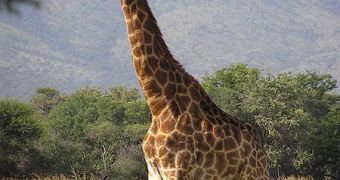Zimbabwe has been affected by a number of very difficult problems over the years, which seem to have increased in intensity recently. Faced with a cholera outbreak and a rate of unemployment of more than 90 percent, the starving population of the African country is now turning its attention to the nation's famous game parks. Elephants, rhinoceroses, giraffes and other creatures are being hunted by people just to have something to eat, or to make some money out of. Wardens in the parks say that there is little they can do, on account of the fact that poachers number in the millions.
According to attendants to one of the parks, quoted by Sue Lloyd-Roberts of DailyMail, the starving people place traps on the paths that animals use to travel from their grazing fields to the watering holes. They are made up of old telephone wires, or anything else that could be broken apart. The traps hurt the animals to a great extent, as they are simply designed to catch, and not to reduce the amount of pain the game feels.
Even zebras are targeted, but, officially, nothing is wrong in the country. The government is against any “negative reporting,” which means that people talking to the foreign media are in danger of being punished for their “crime.”
The scale of the damage is unfathomable, the caretaker tells the reporter. Usually, in the southern parts of Africa, elephants are killed off in entire families at once, in culls meant to protect the local agriculture.
This has been done over hundreds of years, and entire groups are eradicated because these animals form very strong family bonds with each other, and even the ancestors of the people currently inhabiting the lands thought it was less cruel to kill all, than just a few members. However, park wardens have recently noticed a lot of baby elephants and young adults moving across the park on their own, and have immediately realized something is wrong.
Zimbabwe Conservation Task Force expert Johnny Rodrigues says that he has clues that now the culling takes place on an industrial scale, and has extended to many other animal species other than elephants. “The refrigerated lorries which were once used for transporting beef around the country are now being seen in the game parks. I am receiving reports that tonnes of elephant meat are being loaded onto these trucks and transported direct to army barracks,” he explains to Lloyd-Roberts.
Unfortunately, there is no end on sight for the crisis in Zimbabwe. The United Nations food-relief program has been halted while the harvesting goes on, but the yield is expected to supply just a fraction of the needs of the entire population. “You never saw that before. The poachers used to take only the tusks. Now they are taking the meat as well. If this does not stop, in five years' time there will be no elephants left in Zimbabwe,” Rodrigues adds.

 14 DAY TRIAL //
14 DAY TRIAL //